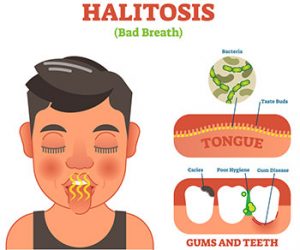Halitosis Explained
What’s the last thing you do before you go on a date or a job interview?
Chances are you brush your teeth, possibly gargle with mouthwash, and look into the mirror to check your smile. You want to look and smell fresh when meeting someone new or spending time with old friends. Bad breath gets in the way of personal contact. People avoid someone with bad breath, move back when they speak and tend to remember the person as the one with the bad breath.
Halitosis, the official term for bad breath, is embarrassing for the person with it and uncomfortable for friends or co-workers. Bad breath affects between 25 and 50 percent of the population. Often the person with bad breath does not know they have it. Mostly patients think halitosis is coming from ‘inside’, the stomach and intestinal track. But in 85% the reason is in the mouth to be found.
The good news is that halitosis can be treated. Firstly, you have to determine the cause and there are many possibilities.
What causes Halitosis?
- Plaque, a sticky film of bacteria, adheres to your teeth and your tongue. Bacteria is the real culprit, and bacteria in the mouth increases when it finds food particles to nourish it. It can combine with the protein in the food to create a sulfurous odor.
- Not enough saliva, or dry mouth, can also result in bad breath. Saliva helps cleanse the mouth of unwanted bacteria.
- Dental cavities can give off an odor.
- Gum disease or periodontal disease can also result in bad breath.
- Poorly fitted dentures can provide spaces for food to get caught.
- Eating foods such as garlic or onions can cause temporary bad breath.
- Morning breath is also a temporary experience, mainly because your mouth gets dry overnight.
- Smoking contributes to bad breath as well as to gum disease.
- Alcohol consumption can also cause bad breath.
- Infections in your mouth, nose or throat can also be a cause.
- Certain medications can produce bad breath as a side effect.
- Small stones covered with bacteria can form in the tonsils and can cause a foul odor.
- Medical conditions such as diabetes, acid reflux, cancers, and metabolic diseases can result in bad breath.

What you can do to prevent Halitosis?
Below is a list of many things you can do to prevent and eliminate Halitosis.
- Brush your teeth twice a day for 2 minutes with fluoride toothpaste. This will remove most of the food particles in your mouth.
- Floss daily to remove the rest of food particles and reduce the bacteria in your mouth.
- Rinse with an antibacterial mouthwash.
- Clean dentures thoroughly but in some cases a new denture needs to be designed for better self-cleaning ability.
- Clean your tongue. Most of the smell may come from the back of your tongue and the fissures in the tongue that can hold onto bacteria.
- Drink plenty of water. A dry mouth means there is less saliva and you need saliva to help clean your mouth.
- Chew sugar free gum to stimulate the production of saliva.
- See your dentist if bad breath persists. They may clean your tongue and rate the severity of the odor on a 1-6 scale and give you steps to take to get rid of bad breath. They will also check to determine the cause of your bad breath.
If the cause is outside the scope of the dentist, he or she will refer you to a General Practitioner or Family Doctor. Your dentist may also work with the family doctor to find a solution.

Resources
- A soft toothbrush, which you change frequently, especially after you have had a cold or sinus infection.
- Toothpaste containing fluoride.
- Dental floss, toothbrush with a rubber tip for removing food particles, or a water flossing system to irrigate the mouth and remove food particles.
- Tongue scraper – found next to dental supplies in local pharmacies. Gently scrape your tongue to remove bacteria.
- Water to keep your body including your mouth hydrated.
- Fluoride mouthwash or mouth rinse. Gargle daily.
- Regular dental cleanings and checkups to catch cavities or infections before they get worse.
If you would like to know more about Halitosis please give us a call 07 3221 0443 or Contact Us and we will arrange a consultation at your convenience. Dr. Florian Mack looks forward to having the opportunity to speak with you in either Brisbane City, Robina or Toowoomba practice.
